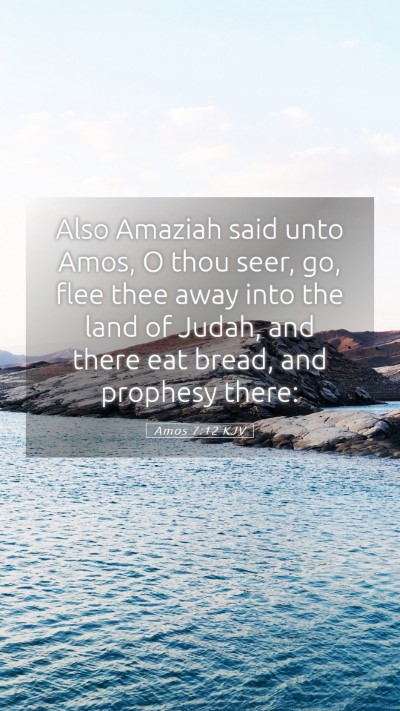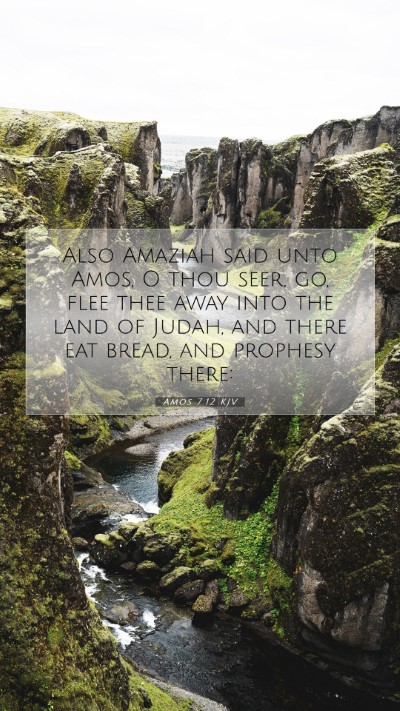Old Testament
Genesis Exodus Leviticus Numbers Deuteronomy Joshua Judges Ruth 1 Samuel 2 Samuel 1 Kings 2 Kings 1 Chronicles 2 Chronicles Ezra Nehemiah Esther Job Psalms Proverbs Ecclesiastes Song of Solomon Isaiah Jeremiah Lamentations Ezekiel Daniel Hosea Joel Amos Obadiah Jonah Micah Nahum Habakkuk Zephaniah Haggai Zechariah MalachiAmos 7:12 Meaning
What is the meaning of Amos 7:12?
Also Amaziah said unto Amos, O thou seer, go, flee thee away into the land of Judah, and there eat bread, and prophesy there:
Amos 7:12 Bible Verse Meaning
Understanding Amos 7:12
In this analysis, we will explore the profound meanings found within Amos 7:12, drawing from insights provided by renowned public domain commentaries such as those by Matthew Henry, Albert Barnes, and Adam Clarke.
Bible Verse Transcription
“And Amaziah said unto Amos, O thou seer, go, flee thee away into the land of Judah, and there eat bread, and prophesy there:” (Amos 7:12, KJV)
Verse Context
The Book of Amos is a rich narrative of prophecy wherein Amos, a shepherd and fig farmer from Tekoa, is called to deliver messages of warning to the Northern Kingdom of Israel. This particular verse is significant as it depicts the tension between the prophet and the religious leaders of Israel.
Commentary Insights
Matthew Henry's Commentary
Matthew Henry emphasizes the conflict between true prophecy and established priesthood. In this passage, Amaziah, the priest of Bethel, dismisses Amos' prophecies, suggesting that he return to his homeland. Henry views this as a representation of how the truth can be unwelcome in places where corruption reigns, providing a lesson about the rejection of divine truths by those in power.
Albert Barnes' Commentary
Albert Barnes highlights that Amos’ message is not merely for personal consolation but for the necessary confrontation of the sins of Israel. He interprets Amaziah's directive to Amos as an attempt to silence the prophet's message. Barnes elaborates on the theme of exile, illustrating that true prophets often face opposition, thus reinforcing the resolve of believers to uphold divine truth despite challenges.
Adam Clarke's Commentary
Adam Clarke notes the irony in Amaziah's instruction—suggesting that Amos should return to Judah to share his prophecies only there, indicating the refusal to address the issues directly at hand. Clarke suggests that this reflects a broader tendency for those in sin to avoid accountability and the ongoing challenge faced by prophets in calling out wrongdoing.
Spiritual and Practical Applications
- Recognition of Prophetic Voices: This verse serves as a reminder to be receptive to the voices of truth in our lives, especially when they challenge the status quo.
- Facing Opposition: Understanding that true biblical teachings may involve facing opposition or hostility, akin to what Amos encountered, encourages believers to stand firm in their faith.
- Call to Accountability: The dismissal of the prophet acts as a caution against rejecting divine warnings, highlighting the importance of self-examination and repentance.
Cross References
- Jeremiah 26:8-9: Where a prophet faces hostility for speaking against the status quo.
- Ezekiel 2:3-5: Insights into God’s commission for prophets to speak His word even amidst opposition.
- Lamentations 3:34-36: God's concern for justice and the serious consequences of ignoring divine mandates.
Conclusion
Amos 7:12 encapsulates key themes of rejection, the role of a prophet, and the necessary confrontation of sins within society. By studying this verse, individuals engaged in Bible study groups and those seeking understanding of Scripture can derive profound insights into the nature of prophecy and the pivotal role of accountability in spiritual life. The verse invites reflection on how we respond to messages of repentance and justice, whether through personal application or communal dialogue.


